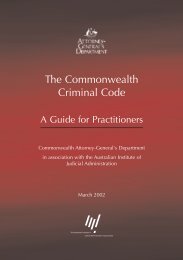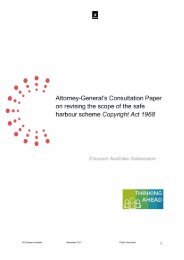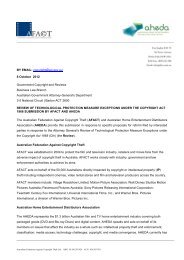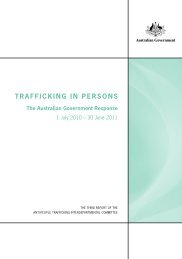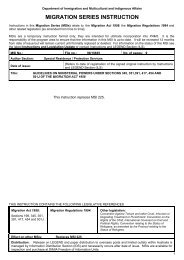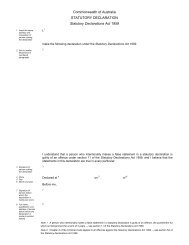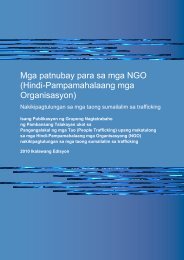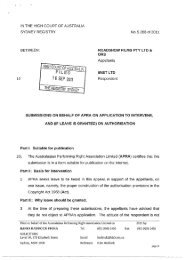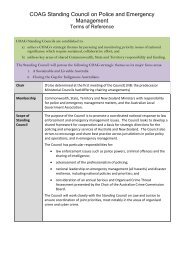Normann Witzleb [PDF 657KB] - Attorney-General's Department
Normann Witzleb [PDF 657KB] - Attorney-General's Department
Normann Witzleb [PDF 657KB] - Attorney-General's Department
Create successful ePaper yourself
Turn your PDF publications into a flip-book with our unique Google optimized e-Paper software.
<strong>Normann</strong> <strong>Witzleb</strong>, A Commonwealth Statutory Cause of Action for Serious Invasion of Privacy, Submission<br />
5. If the privacy interest is outweighed by public interests, in<br />
particular freedom of expression, the plaintiff’s privacy claim<br />
should not succeed. Following the proposal of the VLRC, the onus<br />
of establishing the facts underlying the public interest defence<br />
should fall on the defendant. The proposals of the ALRC and the<br />
NSWLRC, which would effectively require the plaintiff to satisfy the<br />
courts that the privacy interest outweighs countervailing public<br />
interests, have the potential to cause procedural unfairness.<br />
6. The legislation should clarify that any limitation of privacy needs to<br />
be proportionate to the aim of protecting public interests, such as<br />
the interest in freedom of speech, and vice versa.<br />
7. The limitation of the cause of action to intentional and reckless<br />
conduct, as proposed by the ALRC, should be rejected. Instead,<br />
the approach advocated by the NSW Law Reform Commission and<br />
the Victorian Law Reform Commissions is to be preferred. It would<br />
require courts to take the degree of fault into account in the<br />
overall assessment of whether there was an actionable invasion<br />
of privacy. Following the NSW law reform proposal, a defence of<br />
innocent dissemination should also be introduced.<br />
8. The cause of action should not be limited to intrusion into<br />
seclusion and misuse of personal information but be formulated<br />
broadly to make the law ‘future-proof’ and to enable other forms<br />
of privacy infringement to be accommodated, if and when they<br />
arise.<br />
9. Apart from the public interest defence, the interests of defendants<br />
should be protected as follows:<br />
a. There is no need for a separate defence of consent. The<br />
ALRC and the NSWLRC are rightly of the view that a<br />
plaintiff who consents to an invasion of privacy will<br />
generally no longer be able to establish a reasonable<br />
expectation of privacy. Following the VLRC, however, the<br />
existence of consent should be pleaded and, if necessary,<br />
proven by the defendant.<br />
b. A proportionality requirement needs to be added to the<br />
defence that an ‘act or conduct was incidental to the<br />
exercise of a lawful right of defence of person or property’.<br />
c. The scope of the defence ‘required or authorised by or<br />
under law’, as discussed by the law reform commissions,<br />
is overly broad and ought to be reconsidered.<br />
d. The defence of ‘fair comment’ proposed by the VLRC is<br />
unnecessary.<br />
10. The proposals of the ALRC and NSWLRC which give the court a<br />
wide discretion to grant the remedy that is most appropriate in the<br />
circumstances, are preferable over the more restrictive approach<br />
of the VLRC. In particular, the courts should have the power to<br />
award gain-based remedies where the defendant acts with a profit<br />
motive.


![Normann Witzleb [PDF 657KB] - Attorney-General's Department](https://img.yumpu.com/26247895/2/500x640/normann-witzleb-pdf-657kb-attorney-generals-department.jpg)

